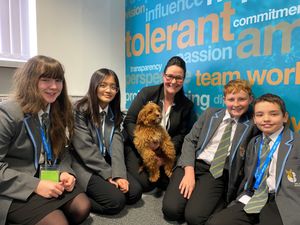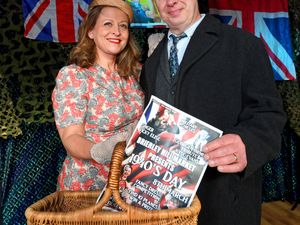How Rufus, a five-month-old puppy, will be helping pupils at a Rugeley school
Meet Rufus – the five-month-old cavapoo who has been melting the hearts of secondary school pupils and staff.

This adorable puppy is currently training to become a therapy dog and has been getting used to his surroundings at The Hart School in Rugeley.
The canine member of staff, who has his own a unique list of demands such as being brushed every day, is already making a difference by helping pupils to feel more relaxed.
At the moment, the new recruit is spending every day with the school’s exams officer, Fran Kinnstein, and anyone else that is lucky enough to get a bit of time with him.
But once he has completed his training, he will become a full-time member of the team, supporting students and staff in his own special way, every day.
The school specifically picked a cavapoo – which is a cross between a poodle and a Cavalier King Charles Spaniel – due to the hypoallergenic nature of a poodle, as well as the intelligence and calmness that comes from this particular breed.

“Therapy dogs have very special places in the schools that take the time to invest in training one,” says assistant principal and head of sixth form Ben Brennan. “The role of a therapy dog is to react and respond to people and their environment, under the guidance and direction of their handler.
“For example, an individual might be encouraged to gently pat or talk to a dog to teach sensitive touch and help them be calm.
“Having a dog in school has the potential to help young children to develop in a range of academic, personal and social areas.
“When Rufus has completed his training with Miss Kinnstein, he will be able to teach empathy and appropriate interpersonal skills, help individuals develop social skills, be soothing and help to improve an individual’s skills to pick up social cues imperative to human relationships.”
A growing number of schools are recruiting therapy dogs and research has shown that they can help to reduce stress and increase energy levels for students.
Interaction with dogs is said to increase levels of neurotransmitters associated with happiness and bonding, while reducing chemicals associated with distress.
Throughout history, dogs have been recruited to bring comfort and happiness to those who need it and since 1983, Pets as Therapy, a charity based in Oxfordshire, has been taking temperament-assessed pets to care homes, hospitals, hospices, schools and prisons.
The charity says having a dog in school can have a positive impact on a child’s educational, social and emotional welfare and its Read2Dogs scheme allows youngsters to improve their reading skills by reading a story aloud to a great, non-judgemental listener.
Pupils look forward to spending time with their four-legged friend, which in turn creates a bond of trust, empathy and understanding of the needs of the pet.
The Hart School hopes to offer the same benefits to its pupils by having its own therapy dog available on site every day.
“Very soon, he will be a full time member of staff, with students being able to access the benefits of Rufus all day, every day,” says Ben.
“From students reading to him, to being a ‘pull’ that can help with attendance – Rufus has so much to offer.”

Students have been delighted by their new four-legged companion and one pupil in Year 7 even treated him to some puppy toys – he loved them so much that he immediately jumped in the box with them.
His handler/trainer Miss Kinnstein says he is calm, friendly and gentle in school and students are great at respecting his training and not being too excitable around him. However, at home is rambunctious and charges around the garden with the six chihuahuas that make up his family.
His favourite food is the chicken he has for breakfast – something his siblings don’t get – but he needs more energy as he is a working dog and has a busier day than the average pet.
Rufus, who underwent general puppy training at Trentham Dog Training School, has been given his own ID badge which he wears on his collar and means he can go where he wants – he can often be found sniffing around the library – and his own school tie.
It will take another 12 months for Rufus to become a qualified therapy dog and he will undergo external training. Eventually, he will be able to ‘work’ for three hours every day with the students that need Rufus’ help the most.
“We’ve been amazed by how the students and staff have been affected already,” says Ben. “He always gets a reaction when he goes into a class, and just a couple of minutes with Rufus can leave you feeling more relaxed.”




